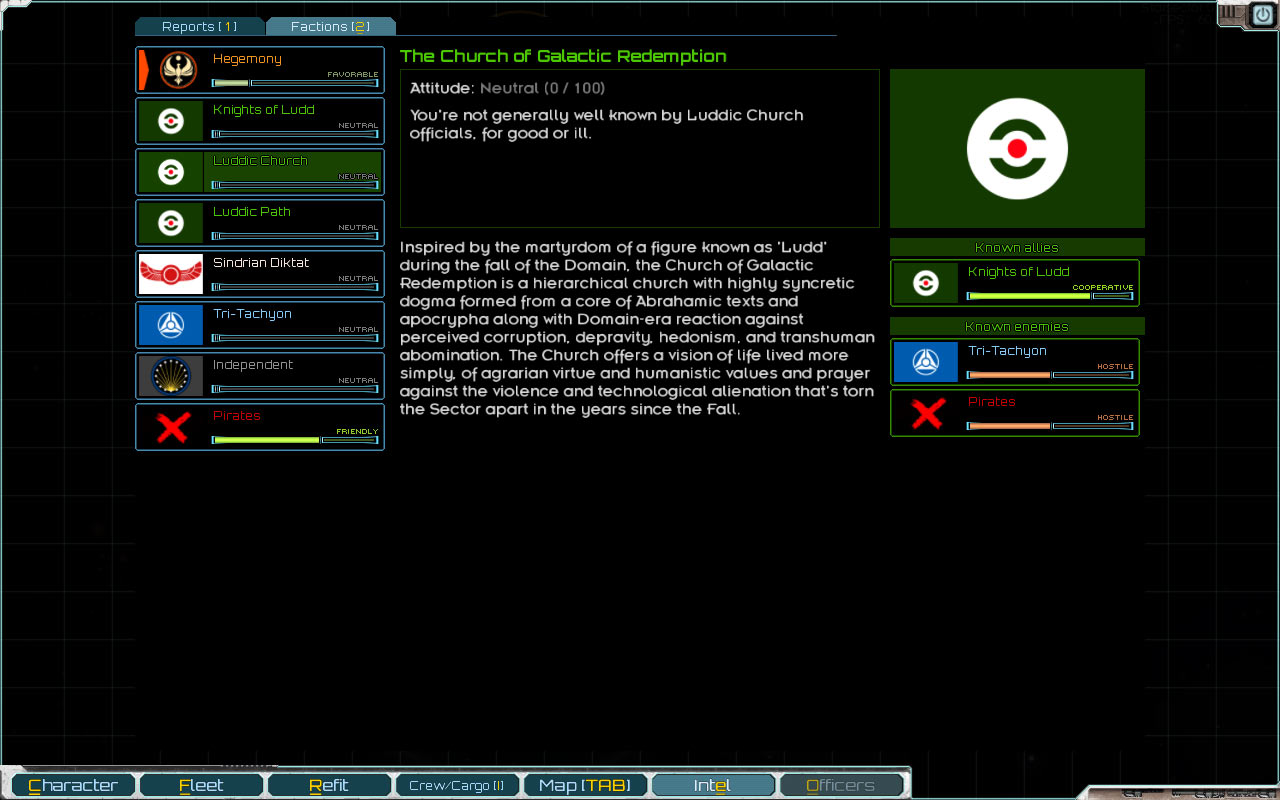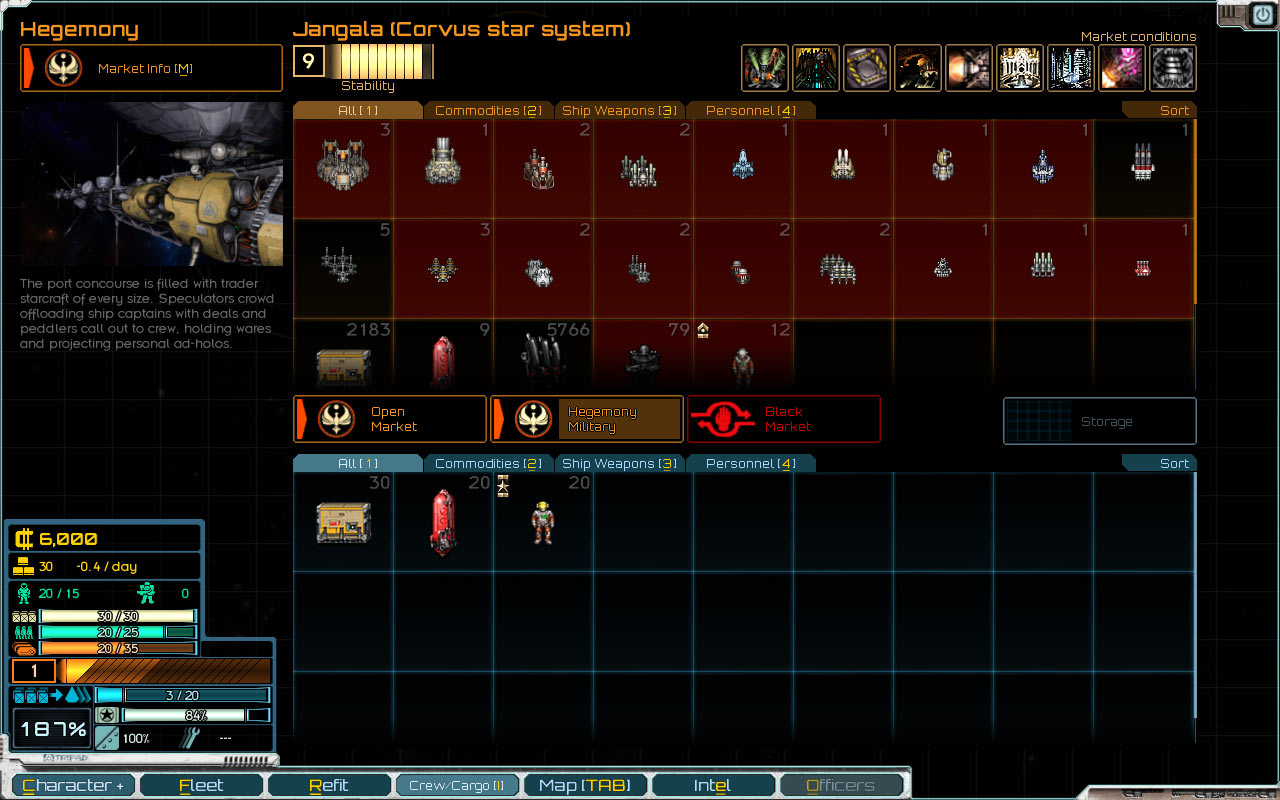Faction Relationships
Sometimes during development, you end up doing things you hadn’t initially planned on doing. Fleshing out player-faction relationships is one of those things. It was something I knew I’d have to look at eventually – the current system having two attitudes towards the player – “meh” and “shoot first and don’t ask questions”, with nothing in between, was definitely not going to hold up. Initially, though, it didn’t seem connected to the economy and events systems, which are the focus of the upcoming release. So, how did faction relationships get dragged into this?
With the introduction of trade and events, player actions carry more meaning than they did before. A successful trade run contributes to the stability of the markets involved; more so if the markets are small. Smuggling can be a hugely destabilizing force. A food shortage has long-term consequences, which depend on how severe it is, which in turn depends on whether the player got involved, and if so, how. Markets declare bounties when hostile fleets are doing damage to the economy, and so collecting on those bounties – by removing said fleets – has a real impact as well.
Not all of these are earth-shaking, and there’s still some work to do on making the consequences more pronounced and more clear. One way to do that that is to make other inhabitants of the world notice, and react to, your actions. It’s a clear way for the game to say “what you just did matters”. Provided that your standing with a faction has a tangible effect, it also increases how much it matters. We get improved clarity and increased impact – a win/win! Factions having more nuanced attitudes and responses to your actions also increases their believability.
This is all a long way of saying that if the player can do things that matter, it’s tough to separate that from NPCs having appropriate reactions, and if those reactions are limited to “attack” and “don’t attack”, that doesn’t provide enough expressiveness. (Put like that, this seems rather obvious… ahem, moving on.)
 If you’re going to have more detailed faction relationships, there has to be some way to see what they are. Darn it, more UI work.
If you’re going to have more detailed faction relationships, there has to be some way to see what they are. Darn it, more UI work.
The New System
The core of the new system is, unsurprisingly, a range of reputation levels that describe a faction’s overall attitude towards you. From worst to best, they are: vengeful, hostile, inhospitable, suspicious, neutral, favorable, welcoming, friendly, and cooperative. Internally, the relationship is still represented as a single number, from -100 to 100. (Why have both? Discrete levels are useful when you want to say, for example, “hostile factions will attack you on sight”, and also describe what the number means. The number itself is useful for when the player wants to see the exact impact of their reputation-changing actions, e.g. “increased by 3”.)
The player’s relationship with a faction changes as a response to player actions. How it changes depends on the action, and this is where the system becomes more than just a scale with labels. An action can:
- Change the reputation by a flat amount
- Force the reputation to be at a certain level before applying the change. For example, attacking a faction will set your standing with it to “hostile” if it was higher than that to begin with.
- Require that the reputation be above or below a certain level to even apply the change. For example, once a faction is vengeful, trying to improve your relationship will be difficult – most (or perhaps all) actions will have no effect. Likewise, a cooperative faction might overlook small transgressions.
- Have a limit beyond which it will not change the reputation. For example, attacking faction fleets won’t take the relationship below “hostile”, unless you also win and pursue their fleeing ships. Retreating immediately without doing any damage will not take the relationship below “inhospitable”.
These last two points have some interesting consequences – you can let “easy” actions have an impact on standing. For example, trading with a faction will improve your standing with them (and reduce standing with their enemies, if they catch wind of it) – but t’s not going to take the standing above “favorable”.
Having an impact on standing makes trade more meaningful, and the limit is what makes it possible – by making it easier to balance. Otherwise, you might get trade as being the fastest way to unlock the rewards of high standing, or the fastest way to erase low standing (the latter isn’t possible because trade doesn’t improve the relationship if it’s already “inhospitable”). Worse, it might not be the fastest, but only the safest, leading to a grind.
It’s still possible to have other trade-related actions that can go beyond “favorable”, if that’s necessary for a trading-focused playstyle to be fun or rewarding.
These reputation limits and requirements are tools that make it possible to fine-tune the role of each action. Does it make sense that selling galoshes to the Sindrian Diktat would be what finally makes them trust you? Or that it would be the final drop before their enemies start attacking you on sight? Maybe these were very high-quality galoshes, so… yes. The important thing is the system has the flexibility to handle either answer, and so makes it easier to add content that interacts with it.
Another tool in the box is making reputation changes from the same action have diminishing returns. Trade actually makes use of this, too; the first few trade-reputation points with a faction are easier to gain, and then it levels out. The goal here isn’t to balance the long-term reputation gain from trade, as the limit sees to that. Instead, those first points let the player know quickly that trade has this effect, and the gain is distributed more evenly as the player levels up, instead of back-loading all of it to when the player has the capacity to trade in bulk. The same approach could easily be used to control long-term reputation gains for a different action too, though it seems to make more sense for an action that doesn’t already have a reputation limit.
Effects of Reputation
Adjusting the player’s reputation is all well and good, but it doesn’t mean anything unless it actually means something, if you know what I mean. Let’s take a look at what each level means in concrete, mechanical terms.
Favorable
Gain access to faction-specific military submarkets, where you can buy fuel, supplies, and weapons.
Welcoming
Higher-quality weapons available.
Friendly
Even higher-quality weapons available.
Cooperative
Best-quality weapons available.
 The Hegemony military market, reputation – favorable. Most weapons aren’t available yet.
The Hegemony military market, reputation – favorable. Most weapons aren’t available yet.
Suspicious
No effect at this point; more of an indicator that maybe they don’t like you a whole lot.
Inhospitable
Markets will refuse to trade with you, except for pirates, who aren’t really a unified faction to begin with. Whether/how this applies to the black market and smuggling is TBD – that is to say, I’m in the process of working it out.
Hostile
Combat-capable fleets will attack you on sight. (This is the starting relationship with the pirates, and yes, they’ll still trade with you.)
Vengeful
You know things are bad when the pirates don’t want to trade with you. Right now, this category matters more for being impossible to get out of than being that much different from “hostile”. There’s some room for more targeted faction actions against you (posting a bounty? an organized effort to bring you to heel?), but it’s not concrete enough to really discuss.
Reputation levels may also have other effects in different areas of the game. For example, if your smuggling activity has resulted in an investigation, a positive reputation level results in a lower chance that you’ll be found responsible. I’d also expect that buying ships will follow along the same lines as buying weapons; also in the process of working it out.
Conclusion
The details of how these interactions work aren’t set in stone, and I’d be surprised if they didn’t change after playtesting. It’s also a system that’s going to work best when there are a lot of actions to choose from, and you’re not forced to, say, do the one specific thing that can get you out of “hostile” standing (currently: doing unpaid bounty work).
Looking at the actions, right now there actually isn’t even one that can take your standing up to “cooperative”. How will that be handled for the next release? One of two ways, most likely – either temporarily making some actions capable of going that far, or by rolling the rewards from “cooperative” into “friendly”.
That’s a minor bit of scaffolding, though, and all in all, Starsector is finally at a point where the amount of such scaffolding seems to be going down rather than up.
Comment thread here.
Tags: campaign, development, factions, media, standing, weapons










